Treble Tribal Trouble: A Review of Ben Cobley’s The Tribe
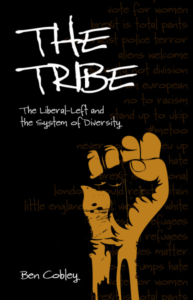 The Tribe: The Liberal-Left and the System of Diversity
The Tribe: The Liberal-Left and the System of Diversity
Ben Cobley
Imprint Academic 2018
I’m sure that Ben Cobley will be displeased to see a positive review of his book The Tribe at a fully certified hate-site like the Occidental Observer. But I think that it’s an important book and that its themes chime perfectly (if incompletely) with those of the Occidental Observer.
Like many other Western nations, Britain has what might be called Treble Tribal Trouble. The first part of our Tribal Trouble is that we’re ruled by a hostile Jewish elite who form a real, genetically interrelated tribe with a quite different set of interests than the native Brits. The second part of our Trouble is that this hostile elite have imported millions of non-Whites and strongly encouraged them to pursue their own advantage with other, home-based identity-groups. The third part of our Trouble is that Whites are discouraged just as strongly from defending themselves. Ben Cobley’s book discusses only the second and third parts of our Tribal Trouble. But it does that very well and I can heartily recommend it to hate-thinkers right across the Anglosphere.
One sinner that repenteth
Cobley is among the first to join what will soon become a flood, when more and more Whites, and White heterosexual men in particular, realize that the “Liberal-Left” hates them, wishes them nothing but ill, and should be treated by them as exactly what it is: an enemy of reason, truth, beauty and freedom. Cobley has seen the Light — and the Blight. He’s described on the back cover as “a former Labour party activist,” and “former” is the mot juste. The Tribe is a series of unspeakable blasphemies against “liberal-left” orthodoxy. Or rather, it’s not, because Cobley speaks his blasphemies very clearly and forcefully. Here’s a prime example, something that all we haters at the Occidental Observer will be delighted to endorse:
The subject of mass immigration probably brings out liberal-left identity and its ideology of diversity in the clearest form. It is unthinkable that the system of diversity could have arisen and developed to anywhere near the degree it has without mass immigration. This defining phenomenon of our times has not just brought in large numbers of people who can be funnelled into the race-based identity groups within the system. It has also offered possibilities to various different groups in British government and political circles, which have gathered around immigration and immigrants as a cause; for them, mass immigration has offered a role and an ongoing project to oversee and enforce. … The radical left [has] found a new class of people to support with its ideologies of oppression [and the] economistic tendency, a dominant force in government circles and public life, [has] found in immigrants a new source of competitiveness and economic activity. (ch. 2, “The Tribe,” p. 50)
Cobley gets it — or a great part of it, at least. But there are two very big omissions in his analysis. First of all, he doesn’t recognize the central importance of biology and genetics in explaining differences in the behaviour and achievements of different human groups, such as Whites and non-Whites or men and women. Second, he committed a huge unconscious irony in naming his book The Tribe, because he doesn’t identify the small but highly determined group that has earnt precisely that title for its supremacist and predatory behaviour down several millennia.
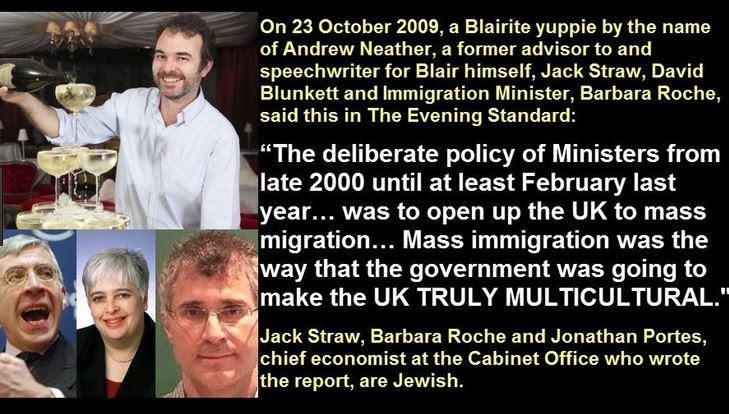
Treble Tribal Trouble: Three Jews who opened Britain’s borders
In short, he doesn’t discuss the central role of Jews in “Liberal-Left” politics and “the System of Diversity.” Jewish organizations and ideologues have driven all the political and cultural developments that Cobley condemns, but Jews appear in this book only occasionally and only as victims of “The System.” Cobley doesn’t discuss the heavily Jewish nature of the New Labour government, which was funded, and therefore controlled, by Lord Levy and a network of Jewish businessmen. He does discuss the nefarious work of the New Labour immigration minister Barbara Roche and her collaborator, the “economist” Jonathan Portes, in opening Britain’s borders to the Third World and to cheap Eastern-European labour (pp. 57-8). But he doesn’t identify them as Jewish and doesn’t quote Roche’s highly significant admission to the Guardian in 2001: that she “entered politics … to combat anti-semitism and xenophobia in general.”
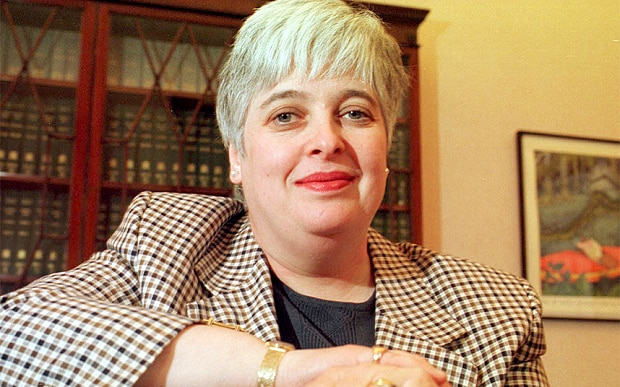
Sinister minister Barbara Roche
Sacks Appeal
Nor does Cobley quote admissions by two other Jews which would have fitted perfectly into his analysis of identity politics and the enormous harm it is doing to this country. Here is the former Chief Rabbi, Jonathan Sacks, describing the origins of identity politics:
Sacks said Britain’s politics had been poisoned by the rise of identity politics, as minorities and aggrieved groups jockeyed first for rights, then for special treatment. The process, he said, began with Jews, before being taken up by blacks, women and gays. He said the effect had been “inexorably divisive.” “A culture of victimhood sets group against group, each claiming that its pain, injury, oppression, humiliation is greater than that of others,” he said. In an interview with the [London] Times, Sacks said he wanted his book to be “politically incorrect in the highest order.” (Sacks: Multiculturalism threatens democracy, The Jerusalem Post, 20th October 2007)
And here is Maurice Glasman, the “Blue Labour” peer who saw New Labour’s hatred of the White working-class from the inside:
Labour let in 2.2million migrants during its 13 years in power — more than twice the population of Birmingham. Lord Glasman, 49, had already told BBC Radio 4 recently [in 2011]: ‘What you have with immigration is the idea that people should travel all over the world in search of higher-paying jobs, often to undercut existing workforces, and somehow in the Labour Party we got into a position that that was a good thing. Now obviously it undermines solidarity, it undermines relationships, and in the scale that it’s been going on in England, it can undermine the possibility of politics entirely.’
The academic, who directs the faith and citizenship programme at London Metropolitan University, criticised Labour for being ‘hostile to the English working class’. He said: ‘In many ways [Labour] viewed working-class voters as an obstacle to progress. Their commitment to various civil rights, anti-racism, meant that often working-class voters… were seen as racist, resistant to change, homophobic and generally reactionary. So in many ways you had a terrible situation where a Labour government was hostile to the English working class.’ (Miliband ally attacks Labour migration ‘lies’ over 2.2m they let in Britain, The Daily Mail, 16th April 2011)
Glasman summed up some of the central themes of The Tribe. Cobley’s discussion of modern British politics is based on the concept of two great “identity groups,” which he labels “The Favoured” and “The Unfavoured” (Introduction, p. 5). Among the Favoured, he lists women, non-Whites, immigrants, Muslims, homosexuals, the transgendered, and the disabled. Among the Unfavoured, he lists men, Whites, non-immigrants, Christians, heterosexuals, the “cisgendered,” and the able-bodied. He then conducts what the French philosopher Michel Foucault would have called a cratology — from Greek kratos, “power” and logos, “study” — of the “System of Diversity” that oversees these two groups, sanctifying and rewarding the former, demonizing and punishing the latter.
The sickness of the modern West
Fortunately, Cobley doesn’t mention Foucault and doesn’t torture his readers with sociological jargon or pretentious post-modernism. However, the German philosopher Martin Heidegger does make a few appearances in this book and that is not a healthy sign. Although I can heartily recommend The Tribe to anyone who wants insights into the sickness of the modern West, I wish that it had been better written. Leftism blights everything it touches, including language, and Cobley’s prose sometimes bears witness to his past as “a Labour party activist.” He should have read less of the Guardian and more of George Orwell.
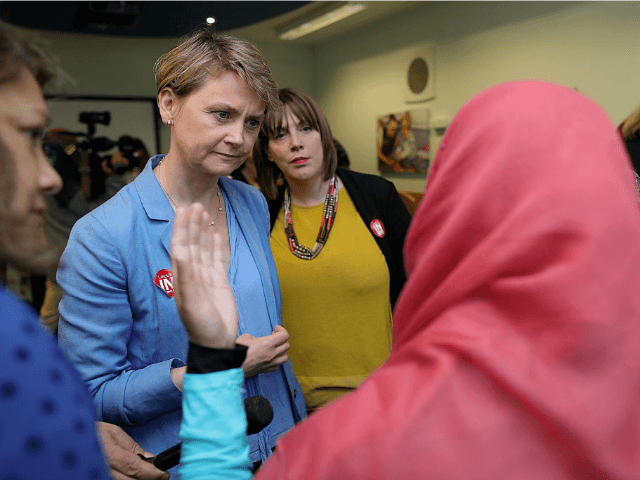
The System at work #1: Labour fem-pols with a Muslim woman
And perhaps he should have been autobiographical and described the direct experiences that led him to abandon the Labour party. He’s seen the Blight, but I couldn’t detect any clear disgust or horror at what the System of Diversity is doing to Britain. His tone throughout is calm, measured, and reasonable, which is, of course, a refreshing contrast to the hysteria and mendacity of the System. But is such a tone appropriate when one is discussing matters like “the sustained attempts to cover up mass child sexual exploitation (CSE) committed by gangs of mostly Pakistani Muslim men in Rotherham and elsewhere”? (Introduction, p. 7) Perhaps it is: Cobley may feel that the horrors speak for themselves. Here’s part of a positive review of The Tribe which won’t have displeased him:
In the first 30 pages Cobley tells the story of Rotherham through the lens of the system of diversity. He documents how leaders drawn from one of the system’s favoured groups — Pakistani Muslims — were able to cover up an extraordinary crime spree (at least 1400 children sexually abused in a single town). State institutions simply outsourced authority over that group to state-funded ‘community leaders’, especially Pakistani-background Labour Party councillors.
These individuals — by constantly referring to ‘community cohesion’ and making accusations of racism — were able to ensure police officers, teachers, and social workers from every kind of background were simply ignored when they pointed out that there was, in fact, a vast pool of criminality pullulating under their noses. Criticism was construed as an attack on a group the ‘system of diversity’ favours, or even on the idea of diversity or variation itself. Meanwhile, politicians and civil servants higher up the food chain (overwhelmingly posh, even though drawn from Labour) simply rescinded responsibility for their constituents. One social worker told the Rotherham Inquiry, ‘if we mentioned Asian taxi drivers we were told we were racist and the young people were seen as prostitutes,’ while another said ‘we were constantly being reminded not to be racist’. (The UK Labour Party and the System of Diversity, Quillette, 6th September 2018)
I think Quillette publishes some valuable criticisms of “left-liberal” politics, but anyone who visits the site will be greeted sooner or later by the mournful and horse-like features of the Jewish writer Hannah Arendt. With a tutelary spirit like Arendt and a Jewish editor in Claire Lehmann, Quillette is certainly not going to “Name the Jew” as the Occidental Observer so obstinately and obnoxiously does (for example, they would publish Nathan Cofnas’s critique of Kevin MacDonald’s The Culture of Critique without responding to repeated requests that he be allowed to reply).
Myopic MacShane and his “multicultural community boat”
But Jews and their political interests played a central role in the Rotherham horrors, albeit one that has never been recognized by any mainstream commentator. The Tribe doesn’t even mention Denis MacShane, the myopic Labour MP who served what he called “my wonderful constituency” of Rotherham while Muslim rape-gangs and child-prostitution networks were hard at work. MacShane, whose birth-name was Matyjaszek and who may be half-Jewish, has long proclaimed his ardent feminism and his concern for the female victims of sexual violence.
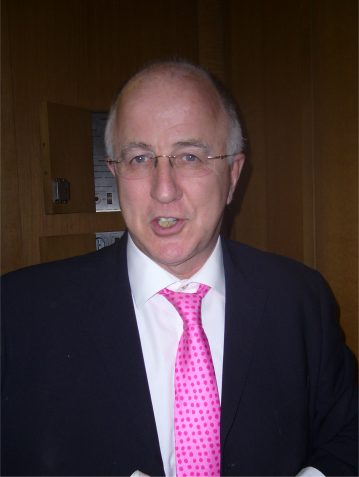
Denis MacShane before his jail-sentence
But year after year as MP for Rotherham, he entirely failed to help the young White working-class girls who were being raped, prostituted and subjected to extreme violence by brown-skinned Pakistani Muslim men. MacShane’s risible and entirely inadequate excuse for his failure was that, “as a true Guardian reader, and liberal leftie,” he “didn’t want to raise … the oppression of women within bits of the Muslim community in Britain” and thereby “rock the multicultural community boat.”
Mourning MacShane
But while MacShane-Matyjaszek entirely failed a large group he was both employed and honour-bound to protect, he didn’t fail a tiny group to whom he had no such official duty. He worked tirelessly for Britain’s tiny Jewish community, whose chief newspaper, The Jewish Chronicle, lamented the “fall from grace” that would end in MacShane’s jailing for fraud in 2013:
Why we should mourn Denis MacShane’s fall from grace
A year ago, I wrote in these pages that the Jewish community needed to decide if it wished to stand by one of its greatest champions after he resigned as MP for Rotherham. His disgrace is greater now and there is every reason to feel disappointed in Denis and even let down. There are those who will suggest that the causes he espoused are somehow morally poisoned by the crimes to which he has admitted. There are certainly some who will draw comfort from the fact that such an active campaigner has been removed from the field.
I have no doubt that, whatever happens, Denis MacShane will be back. He has reinvented himself before and he will do it again, perhaps under his original name, Denis Matyjaszek. But, for now, others must enter the rather large space he vacates fighting racism and totalitarianism. His causes are pure, even if Denis MacShane is less so. (Why we should mourn Denis MacShane’s fall from grace, The Jewish Chronicle, 22nd November 2013 / 19th Kislev 5774)
As I described in “The Riddle of Rotherham,” MacShane viewed his role as MP for Rotherham simply as a way to facilitate his work on behalf of Jews. He didn’t care about the White working-class in Rotherham any more than The Jewish Chronicle does. The Chronicle would dismiss Rotherham in the same way as it dismisses nearby Barnsley: “not a Jewish place.” But that’s only one way in which Jews were central to the Rotherham horrors. They were also responsible for forging the minority-worshipping identity politics that Ben Cobley so skilfully and precisely dissects in The Tribe.
“A full set of unfavoured identifiers”
For obvious reasons, Cobley doesn’t name Jews as the originators of identity politics. As we saw above, the former Chief Rabbi Jonathan Sacks could do that in 2007 because he was protected by his own status as a Jew. But Sacks’ remarks went little-remarked at the time and only hate-sites like the Occidental Observer will publicize them now. Ben Cobley certainly couldn’t have included them in The Tribe, because he has been dealt a useless hand in the game of identity politics: “Only heterosexual white-skinned ethnic British or English men have a full set of unfavoured identifiers, so a clear majority of Britain’s population can appeal to membership of at least one favoured group.” (ch. 4, “The Unfavoured Groups,” p. 113)

The System at work #2: Jeremy Corbyn with non-Whites
But some groups are more “Favoured” than others, as Cobley’s discussion of Rotherham reveals. The White working-class girls in Rotherham could “appeal to membership” of the Favoured group of women, but their abusers could “appeal to membership” of even more potent Favoured groups. They were non-White and Muslim. And just like the fraudster Denis MacShane, Britain’s feminists are not going to get between non-White Muslim rapists and their White rapees. Supposedly philogynist feminists and definitely misogynist Muslims are in alliance, as Cobley points out: “To avoid [disrupting the spoils of the diversity-system], other favoured groups must not be disturbed, which is why we rarely see Islamists and feminists directly challenging each other in public.” (ch. 3, “The Favoured Groups,” p. 95)
“The authoritarian’s dream of … uncontested authority”
After discussing “The Favoured Groups,” “The Unfavoured Groups,” and “The Role of Institutions,” Cobley goes on to examine “The Labour Party” and its “Central Role” in the deeply pernicious, but also — for its adherents — highly profitable “System of Diversity.” Britain may soon have a Labour government headed by the minority-worshipping Jeremy Corbyn and the White-hating Diane Abbott, so Cobley’s analysis of his former party has much more than academic or regional interest. But he’s already skewered its ideology in an earlier chapter:
The power to decide what it means to be racist and sexist is reserved for favoured identity group representatives. They have the authority to decide what constitutes their victimhood, based on their knowledge of their victimhood, which is of something absolute, universal and therefore beyond question. This is the authoritarian’s dream of a place of uncontested authority. The system makes the appropriation of victimhood central to securing it, so that the more the favoured groups appear as victims, the more it bolsters their representatives’ authority. (ch. 4, “The Unfavoured Groups,” p. 113)
That is acute analysis written in clear and unpretentious prose. Perhaps Cobley was more influenced there by Orwell than by Heidegger or Marx. But Cobley’s knowledge of Marx sharpens his blasphemy against “liberal-left” orthodoxy, because he’s able to call Marx as a witness for the prosecution:
In 1870, Karl Marx noted how ‘Ireland constantly sends her own surplus to the English labour market, and thus forces down wages and lowers the material and moral position of the English working class.’ He added, ‘This antagonism is the secret of the impotence of the English working class, despite its organization. It is the secret by which the capitalist class maintains its power. And the latter is quite aware of this.’ … The problems associated with contemporary mass immigration are of a similar character [to those described by Marx]: increasing intensification and exploitation of nature and man; opposing classes of people being thrown against each other; rapid population growth; existential defeat for some people and the disappearance of old ways of life, including old working practices. Moreover, the language used by the ideologues of mass immigration is the same as in those times of Industrial Revolution and colonisation: of ‘rationality’, ‘progress’, inevitability’, ‘necessity’ and ‘need’. (ch. 4, “The Unfavoured Groups,” p. 130)
Marx got it too. And unlike Cobley, Marx was prepared to criticize Jews for their role in capitalism and the harm it does to the working-class. Marx’s “On the Jewish Question” (1843) is a notorious piece of left-wing anti-Semitism.
The Hate Community
Cobley no doubt rejects Marx’s criticism of Jews with the same horror as he will reject support from the Occidental Observer. But many in the Hate Community have made the same political journey as he has: from belief in the “System of Diversity” to recognition that it is corrupt, self-serving, and malign. However, Cobley’s journey is far from over. As I noted above, he shows absolutely no recognition of human bio-diversity, which means that he can’t properly explain why mass immigration by Blacks and Muslims has been so bad for a White nation like Britain. These groups are biologically and, at present, intractably different from Whites, because their genetics give them lower average IQs and higher average propensities to crime and clannishness.
Full of blasphemies
They don’t belong in an advanced Western nation like Britain any more than Merkel’s Millions belong in Germany or Macron’s Millions belong in France. But Cobley seems to believe in the Psychic Unity of Mankind and in the long-exploded idea that “There’s Only One Race — the Human Race.” If he does believe in those things, he’s wrong and I hope that he’ll soon see the error of his ways. However, I don’t think he truly believes in the solutions for reform that he offers in the ninth and final chapter of The Tribe, which is entitled “How Should We Respond to the System?”.
As the White working-class would put it: Cobley is pissing into the wind. He’s offering reason and reality to groups that believe only in emotion and egomania. The Favoured are never going to abandon their privileges willingly, and the Unfavoured are never going to remove their stigma without a fight. Cobley has already explained why this is so in the earlier chapters of The Tribe. It’s a valuable and acutely argued book that should be very widely read and even more widely discussed. It won’t be, of course, because it’s full of blasphemies against “diversity” and mass immigration. But that’s precisely why it’s been a perfect book for review at the Occidental Observer.

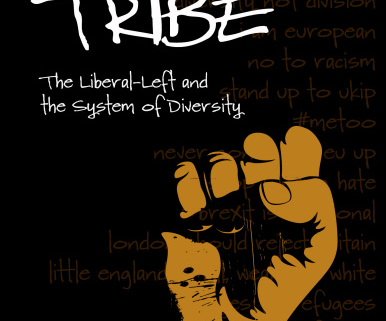




Comments are closed.